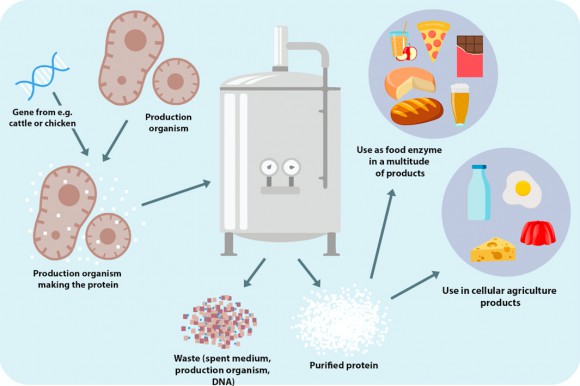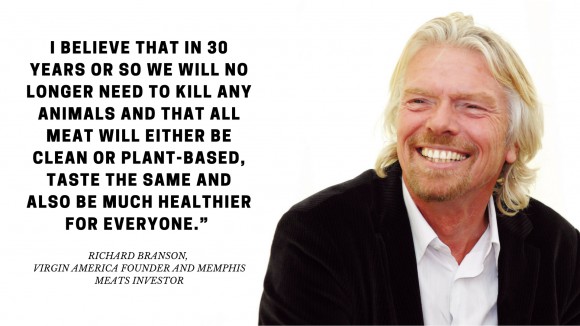GFI challenges Stanford students to change food

What will the plate of the future look like?
At a panel discussion organized by The Good Food Institute at the Stanford Graduate School of Business, speakers mused that the plate of the future just might look like the plate of the present — but with a remarkably different journey guiding each ingredient from farm to fork.

That is, the archaic methods we currently use to industrially produce animal products will be relegated to the dustbin of history, and a new norm for production will be established. Instead of relying on animals for meat, dairy, eggs, and seafood, we will be able to create the same products more efficiently and sustainably through plant sources or by growing animal proteins without the animal.
[That’s right: meat and milk without the cows!]

This represents a foundational shift in the food system, and, as panelists discussed — a tremendous business opportunity. The production of animal products for use in the food supply is a trillion dollar market that is on the cusp of revolution.
[stay tuned — a full recording of the session is coming soon!]
Here are three takeaways about the future of food:
It’s moving fast
Tim Geistlinger, CTO of cow-free dairy startup Perfect Day Foods, has spent his entire career working on cutting-edge biotechnology. He described working in this emerging sector of the food industry as the “fastest, most exciting space” he’s ever been in.
It’s hard to overstate how rapid the growth of both plant-based and clean food tech has been — and how steep industry analysts expect the climb to be in the coming years.

GFI Business Innovation Specialist Aylon Steinhart said:
The most exciting trends we are seeing in plant-based meats, dairy, and eggs is the growing mainstream acceptance of these alternatives to animal-based products. In fact, a study from Mintel reported that â…“ of Millennials surveyed said they eat meat alternatives every single day, and 70% at least a few times a week. Now that’s not saying they eat Impossible Burgers every day, but that they consider substituting meat as part of their regular diet. And what that means is that these flexitarians are driving tremendous growth in this category.
A few factors contributing to the rapid expansion of plant-based alternatives include:
- Growing consumer awareness surrounding the health benefits of plant proteins
- Approaching plant-based product formulation from a molecular level to more closely replicate the taste and texture of conventional animal products
- Exploring novel plant proteins, fats, and so on

Viviane Lanquar, Director of Biochemistry at Just (formerly Hampton Creek), described the company’s robotics platform for plant protein discovery, which JUST is leveraging to bring more diversity into the food supply and support improved functionality for plant-based products.
Just’s scrambled egg, for instance, is primarily made with mung bean protein, a crop that is highly nutritious, resource-friendly, and contributes to the impressive taste and texture of the finished product.

Speaking on the progress of the clean meat industry specifically, UPSIDE Foods VP of Business Development Steve Myrick emphasized recent advances in parallel industries such as regenerative medicine and genetics which have acted like a springboard to accelerate R&D. For example, advances in gene sequencing have made it easier to identify optimal cell lines (think: starter cells) that grow into, say, duck fit to be cooked in Julia Child’s kitchen.

Beyond the technical elements, the speed of this market evolution is being driven by new demands on food production imposed by the ballooning global population and changing climate.
Conventional production processes assume an unchanging world and contribute to resource depletion, environmental degradation, and climate change. Savvy food companies (and even governments) are looking to adaptive technologies like clean meat to ensure food security.
Investors are hungry
The investor pool for plant-based and clean products is broad, deep-pocketed, and equipped with a hefty sense of urgency.
Just to call out a few examples:
- Prominent Sand Hill Road firm DFJ is invested in UPSIDE Foods
- Singapore-state-owned Temasek led Perfect Day’s recently closed Series A round
- Hong Kong-based Horizons Ventures is invested in Just
Even visionary celebrities like Richard Branson and philanthropists like Bill Gates are putting their dollars toward these high-impact endeavors.

Given the relative nascency of this field and the short turnaround time assumed in VC investments, both Lanquar of Just and Steinhart of GFI emphasized the value of full transparency in investor dealings in terms of timeline and technology readiness.
Lastly, Geistlinger of Perfect Day nodded to the importance of partnering with strategic investors who can assist with the scale up process and provide more than just the capital required to contribute to the startup’s long term success.

Opportunities abound
Animal agriculture is an almost unfathomably large industry. Plant-based meat — despite its rapid growth — makes up less than one percent of the total meat market today. Lux Research predicts that alternative proteins will comprise one-third of the protein market by 2054. It’s going to be a fast climb, and there’s plenty of room for new companies and further research across the supply chain.

If you’re a plant biologist, tissue engineer, or food scientist; a data scientist, geneticist or mechanical engineer (the list goes on!), you can help design the improved future of food. Let our Science and Technology team know how you’d like to get involved.
If you’re interested in launching your own innovative food company, consider joining our GFIdeas Entrepreneur Community, where you can access GFI’s resources, get advice from industry experts, and collaborate with like-minded peers.
And if you’re exploring careers in the space, check out these opportunities at good food startups!
Thanks for being part of the solution.
To learn more about GFI’s work supporting healthy, humane, and sustainable foods, click here.

